Business Law: Contractual Aspects of Different Business Entities
VerifiedAdded on 2022/10/19
|6
|1205
|230
Report
AI Summary
This report provides an analysis of contract law in the context of different business entities, including sole proprietorships, partnerships, corporations, and limited liability companies (LLCs). The report examines how each entity type approaches contract creation, negotiation, and approval, highlighting the advantages and disadvantages of each. It further explores the aspects of contract liability, detailing who is responsible for contractual obligations and potential breaches within each business structure. The analysis covers how each entity enters into contracts and is bound by the terms. The report also considers how the choice of business entity affects the ability to enter into contracts of sale and the legal standing of each entity. The report references relevant sources to support its conclusions and provides a comprehensive overview of the legal considerations for businesses when dealing with contracts.

Running head: FUNDAMENTALS OF BUSINESS LAW
1
Fundamentals of business Law
Name
Institution
1
Fundamentals of business Law
Name
Institution
Paraphrase This Document
Need a fresh take? Get an instant paraphrase of this document with our AI Paraphraser
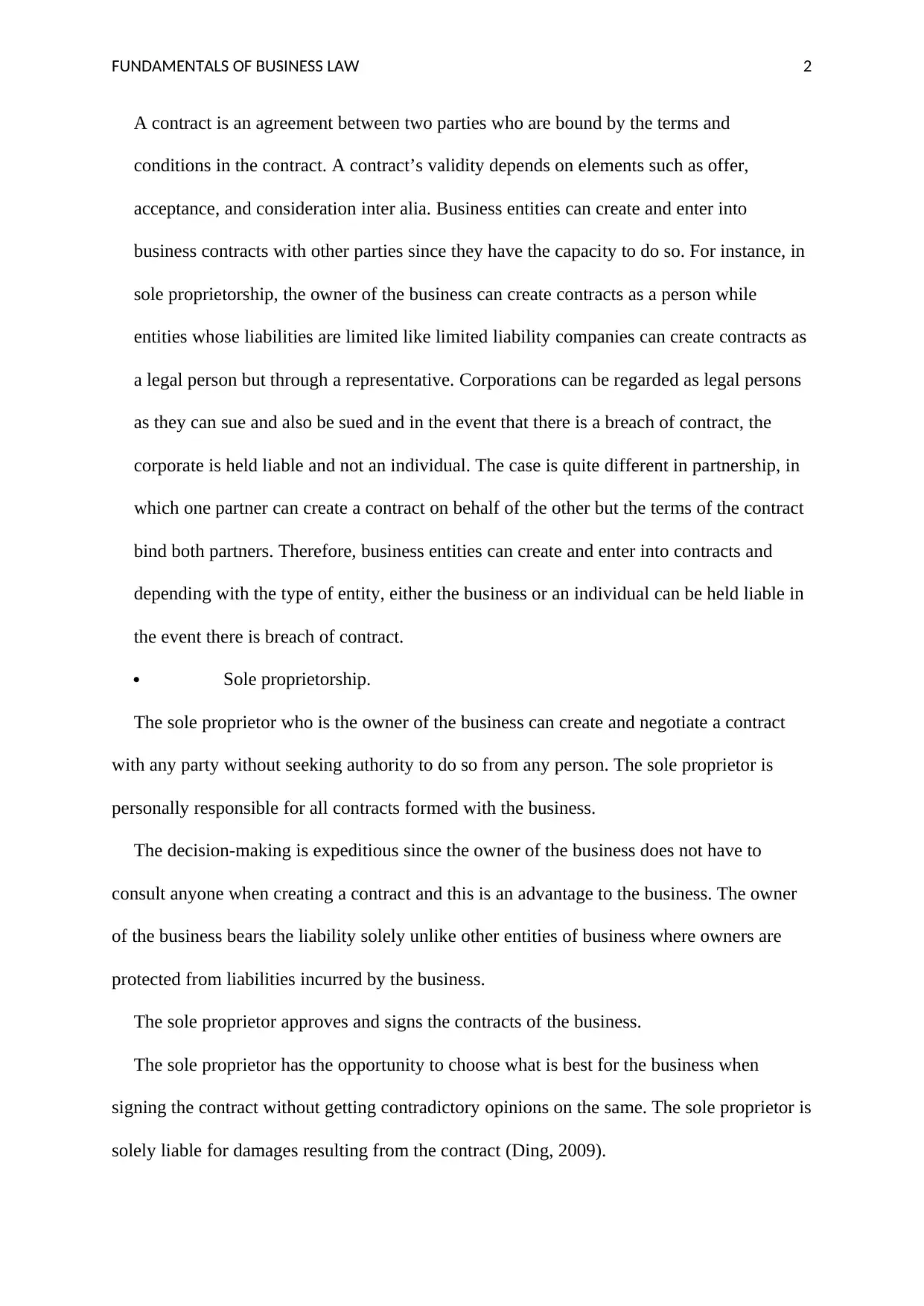
FUNDAMENTALS OF BUSINESS LAW 2
A contract is an agreement between two parties who are bound by the terms and
conditions in the contract. A contract’s validity depends on elements such as offer,
acceptance, and consideration inter alia. Business entities can create and enter into
business contracts with other parties since they have the capacity to do so. For instance, in
sole proprietorship, the owner of the business can create contracts as a person while
entities whose liabilities are limited like limited liability companies can create contracts as
a legal person but through a representative. Corporations can be regarded as legal persons
as they can sue and also be sued and in the event that there is a breach of contract, the
corporate is held liable and not an individual. The case is quite different in partnership, in
which one partner can create a contract on behalf of the other but the terms of the contract
bind both partners. Therefore, business entities can create and enter into contracts and
depending with the type of entity, either the business or an individual can be held liable in
the event there is breach of contract.
Sole proprietorship.
The sole proprietor who is the owner of the business can create and negotiate a contract
with any party without seeking authority to do so from any person. The sole proprietor is
personally responsible for all contracts formed with the business.
The decision-making is expeditious since the owner of the business does not have to
consult anyone when creating a contract and this is an advantage to the business. The owner
of the business bears the liability solely unlike other entities of business where owners are
protected from liabilities incurred by the business.
The sole proprietor approves and signs the contracts of the business.
The sole proprietor has the opportunity to choose what is best for the business when
signing the contract without getting contradictory opinions on the same. The sole proprietor is
solely liable for damages resulting from the contract (Ding, 2009).
A contract is an agreement between two parties who are bound by the terms and
conditions in the contract. A contract’s validity depends on elements such as offer,
acceptance, and consideration inter alia. Business entities can create and enter into
business contracts with other parties since they have the capacity to do so. For instance, in
sole proprietorship, the owner of the business can create contracts as a person while
entities whose liabilities are limited like limited liability companies can create contracts as
a legal person but through a representative. Corporations can be regarded as legal persons
as they can sue and also be sued and in the event that there is a breach of contract, the
corporate is held liable and not an individual. The case is quite different in partnership, in
which one partner can create a contract on behalf of the other but the terms of the contract
bind both partners. Therefore, business entities can create and enter into contracts and
depending with the type of entity, either the business or an individual can be held liable in
the event there is breach of contract.
Sole proprietorship.
The sole proprietor who is the owner of the business can create and negotiate a contract
with any party without seeking authority to do so from any person. The sole proprietor is
personally responsible for all contracts formed with the business.
The decision-making is expeditious since the owner of the business does not have to
consult anyone when creating a contract and this is an advantage to the business. The owner
of the business bears the liability solely unlike other entities of business where owners are
protected from liabilities incurred by the business.
The sole proprietor approves and signs the contracts of the business.
The sole proprietor has the opportunity to choose what is best for the business when
signing the contract without getting contradictory opinions on the same. The sole proprietor is
solely liable for damages resulting from the contract (Ding, 2009).
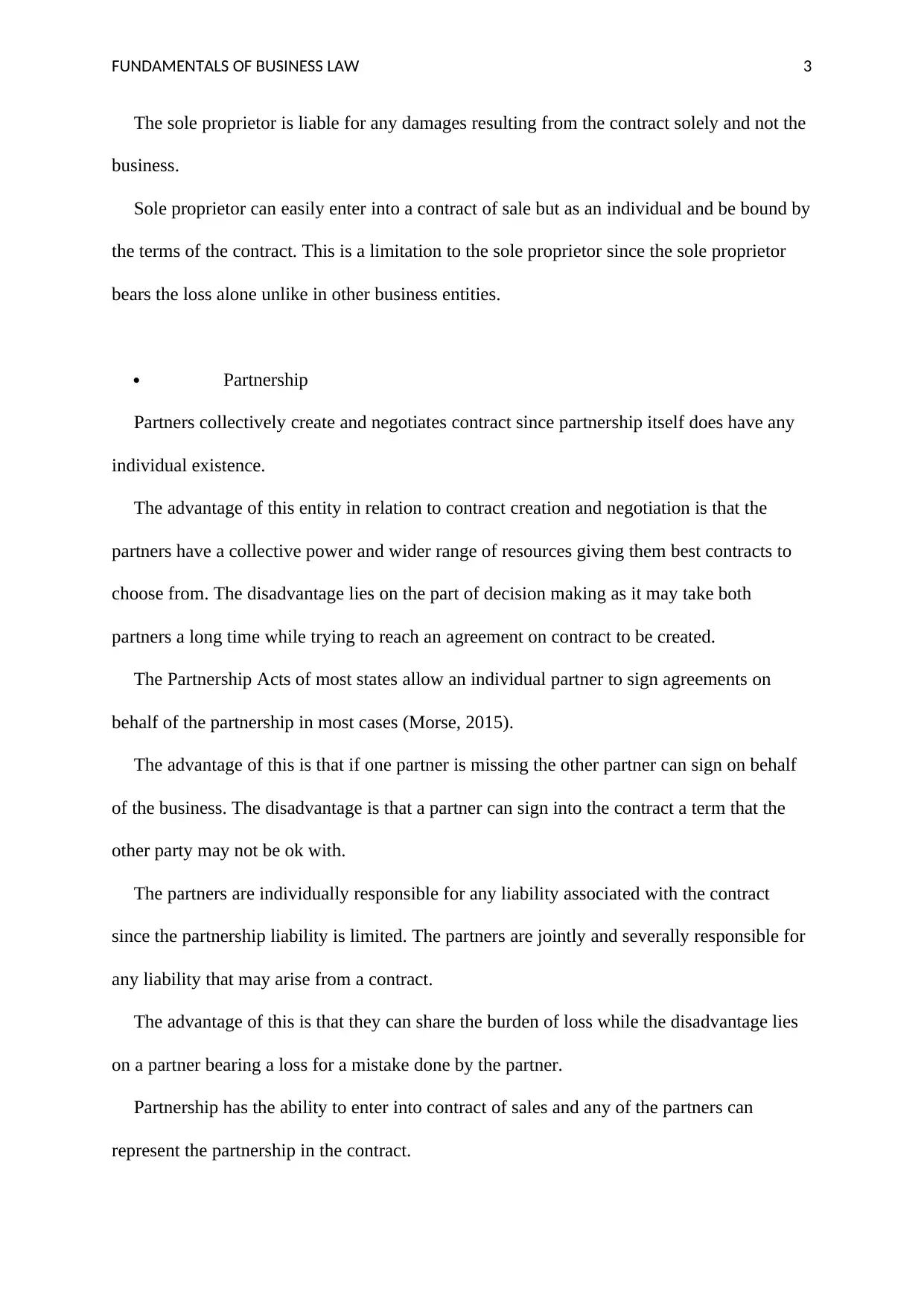
FUNDAMENTALS OF BUSINESS LAW 3
The sole proprietor is liable for any damages resulting from the contract solely and not the
business.
Sole proprietor can easily enter into a contract of sale but as an individual and be bound by
the terms of the contract. This is a limitation to the sole proprietor since the sole proprietor
bears the loss alone unlike in other business entities.
Partnership
Partners collectively create and negotiates contract since partnership itself does have any
individual existence.
The advantage of this entity in relation to contract creation and negotiation is that the
partners have a collective power and wider range of resources giving them best contracts to
choose from. The disadvantage lies on the part of decision making as it may take both
partners a long time while trying to reach an agreement on contract to be created.
The Partnership Acts of most states allow an individual partner to sign agreements on
behalf of the partnership in most cases (Morse, 2015).
The advantage of this is that if one partner is missing the other partner can sign on behalf
of the business. The disadvantage is that a partner can sign into the contract a term that the
other party may not be ok with.
The partners are individually responsible for any liability associated with the contract
since the partnership liability is limited. The partners are jointly and severally responsible for
any liability that may arise from a contract.
The advantage of this is that they can share the burden of loss while the disadvantage lies
on a partner bearing a loss for a mistake done by the partner.
Partnership has the ability to enter into contract of sales and any of the partners can
represent the partnership in the contract.
The sole proprietor is liable for any damages resulting from the contract solely and not the
business.
Sole proprietor can easily enter into a contract of sale but as an individual and be bound by
the terms of the contract. This is a limitation to the sole proprietor since the sole proprietor
bears the loss alone unlike in other business entities.
Partnership
Partners collectively create and negotiates contract since partnership itself does have any
individual existence.
The advantage of this entity in relation to contract creation and negotiation is that the
partners have a collective power and wider range of resources giving them best contracts to
choose from. The disadvantage lies on the part of decision making as it may take both
partners a long time while trying to reach an agreement on contract to be created.
The Partnership Acts of most states allow an individual partner to sign agreements on
behalf of the partnership in most cases (Morse, 2015).
The advantage of this is that if one partner is missing the other partner can sign on behalf
of the business. The disadvantage is that a partner can sign into the contract a term that the
other party may not be ok with.
The partners are individually responsible for any liability associated with the contract
since the partnership liability is limited. The partners are jointly and severally responsible for
any liability that may arise from a contract.
The advantage of this is that they can share the burden of loss while the disadvantage lies
on a partner bearing a loss for a mistake done by the partner.
Partnership has the ability to enter into contract of sales and any of the partners can
represent the partnership in the contract.
⊘ This is a preview!⊘
Do you want full access?
Subscribe today to unlock all pages.

Trusted by 1+ million students worldwide
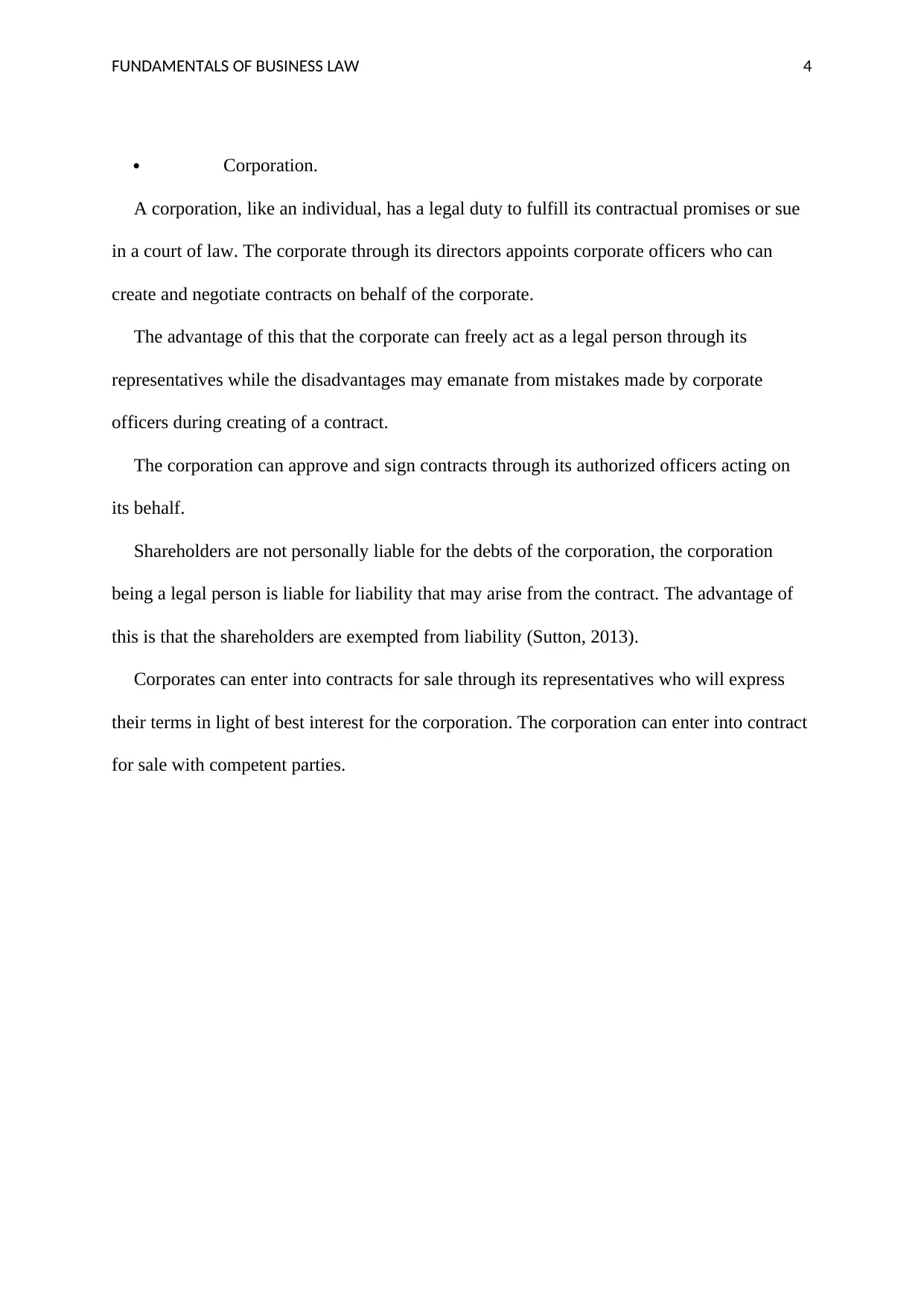
FUNDAMENTALS OF BUSINESS LAW 4
Corporation.
A corporation, like an individual, has a legal duty to fulfill its contractual promises or sue
in a court of law. The corporate through its directors appoints corporate officers who can
create and negotiate contracts on behalf of the corporate.
The advantage of this that the corporate can freely act as a legal person through its
representatives while the disadvantages may emanate from mistakes made by corporate
officers during creating of a contract.
The corporation can approve and sign contracts through its authorized officers acting on
its behalf.
Shareholders are not personally liable for the debts of the corporation, the corporation
being a legal person is liable for liability that may arise from the contract. The advantage of
this is that the shareholders are exempted from liability (Sutton, 2013).
Corporates can enter into contracts for sale through its representatives who will express
their terms in light of best interest for the corporation. The corporation can enter into contract
for sale with competent parties.
Corporation.
A corporation, like an individual, has a legal duty to fulfill its contractual promises or sue
in a court of law. The corporate through its directors appoints corporate officers who can
create and negotiate contracts on behalf of the corporate.
The advantage of this that the corporate can freely act as a legal person through its
representatives while the disadvantages may emanate from mistakes made by corporate
officers during creating of a contract.
The corporation can approve and sign contracts through its authorized officers acting on
its behalf.
Shareholders are not personally liable for the debts of the corporation, the corporation
being a legal person is liable for liability that may arise from the contract. The advantage of
this is that the shareholders are exempted from liability (Sutton, 2013).
Corporates can enter into contracts for sale through its representatives who will express
their terms in light of best interest for the corporation. The corporation can enter into contract
for sale with competent parties.
Paraphrase This Document
Need a fresh take? Get an instant paraphrase of this document with our AI Paraphraser
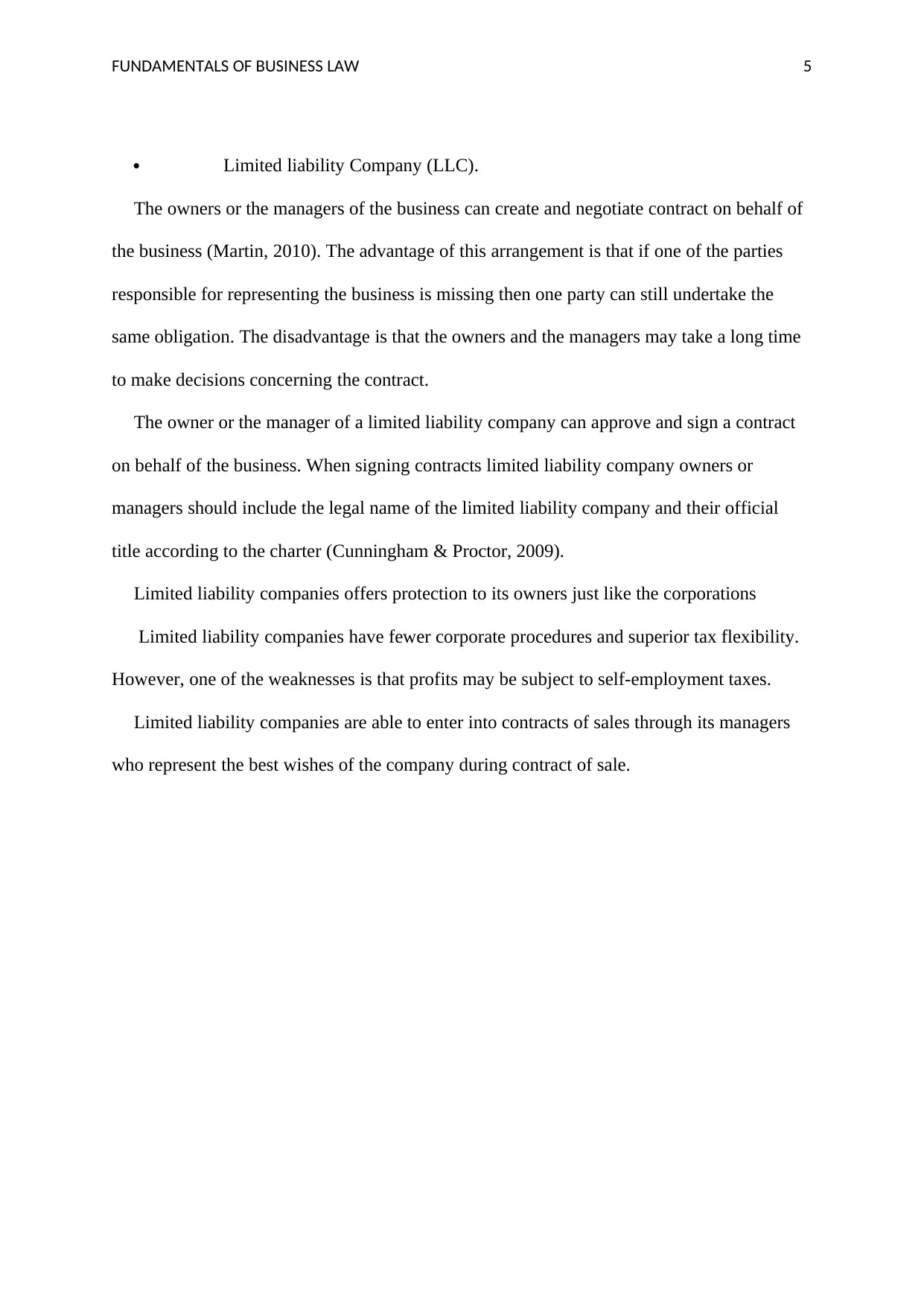
FUNDAMENTALS OF BUSINESS LAW 5
Limited liability Company (LLC).
The owners or the managers of the business can create and negotiate contract on behalf of
the business (Martin, 2010). The advantage of this arrangement is that if one of the parties
responsible for representing the business is missing then one party can still undertake the
same obligation. The disadvantage is that the owners and the managers may take a long time
to make decisions concerning the contract.
The owner or the manager of a limited liability company can approve and sign a contract
on behalf of the business. When signing contracts limited liability company owners or
managers should include the legal name of the limited liability company and their official
title according to the charter (Cunningham & Proctor, 2009).
Limited liability companies offers protection to its owners just like the corporations
Limited liability companies have fewer corporate procedures and superior tax flexibility.
However, one of the weaknesses is that profits may be subject to self-employment taxes.
Limited liability companies are able to enter into contracts of sales through its managers
who represent the best wishes of the company during contract of sale.
Limited liability Company (LLC).
The owners or the managers of the business can create and negotiate contract on behalf of
the business (Martin, 2010). The advantage of this arrangement is that if one of the parties
responsible for representing the business is missing then one party can still undertake the
same obligation. The disadvantage is that the owners and the managers may take a long time
to make decisions concerning the contract.
The owner or the manager of a limited liability company can approve and sign a contract
on behalf of the business. When signing contracts limited liability company owners or
managers should include the legal name of the limited liability company and their official
title according to the charter (Cunningham & Proctor, 2009).
Limited liability companies offers protection to its owners just like the corporations
Limited liability companies have fewer corporate procedures and superior tax flexibility.
However, one of the weaknesses is that profits may be subject to self-employment taxes.
Limited liability companies are able to enter into contracts of sales through its managers
who represent the best wishes of the company during contract of sale.
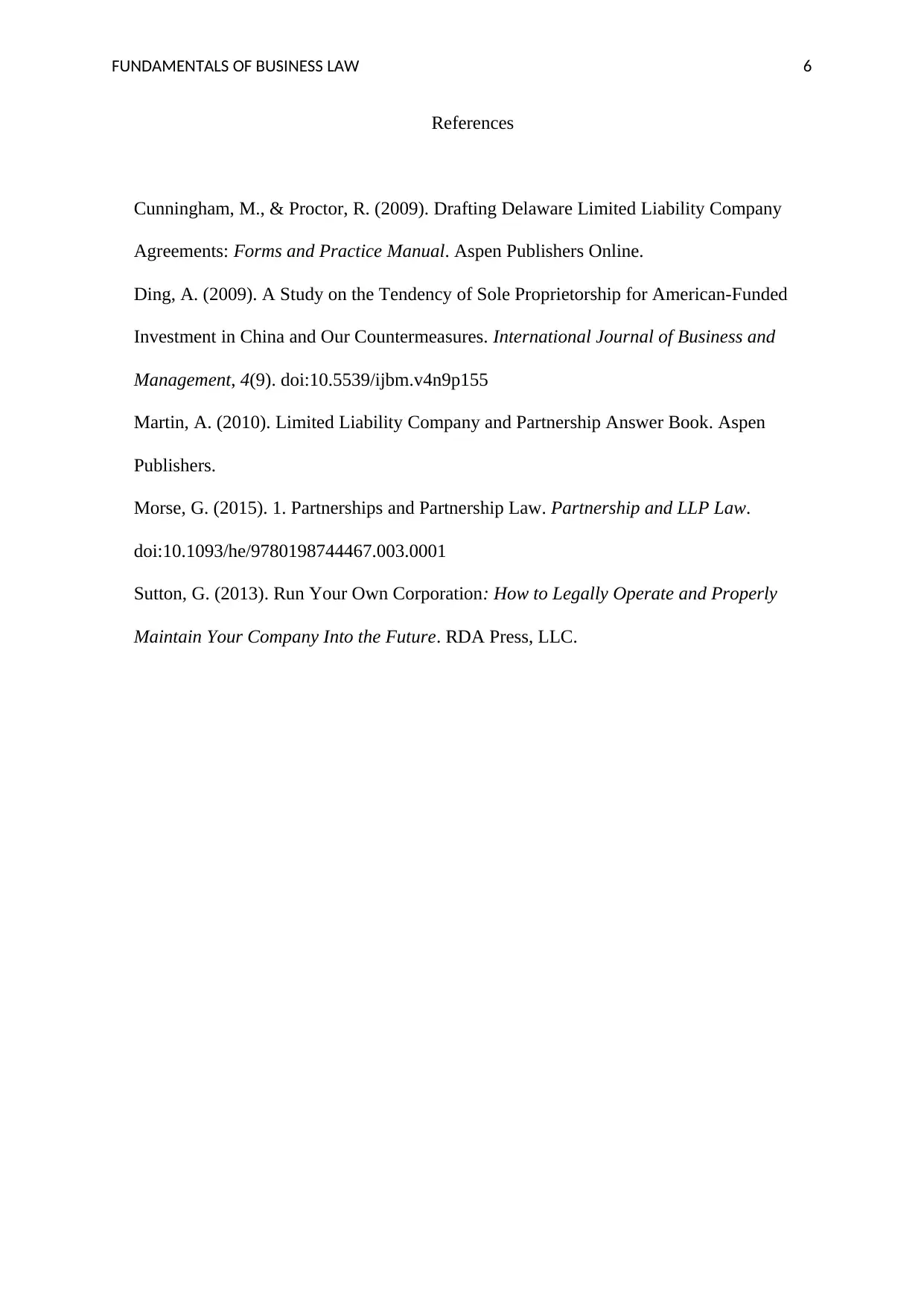
FUNDAMENTALS OF BUSINESS LAW 6
References
Cunningham, M., & Proctor, R. (2009). Drafting Delaware Limited Liability Company
Agreements: Forms and Practice Manual. Aspen Publishers Online.
Ding, A. (2009). A Study on the Tendency of Sole Proprietorship for American-Funded
Investment in China and Our Countermeasures. International Journal of Business and
Management, 4(9). doi:10.5539/ijbm.v4n9p155
Martin, A. (2010). Limited Liability Company and Partnership Answer Book. Aspen
Publishers.
Morse, G. (2015). 1. Partnerships and Partnership Law. Partnership and LLP Law.
doi:10.1093/he/9780198744467.003.0001
Sutton, G. (2013). Run Your Own Corporation: How to Legally Operate and Properly
Maintain Your Company Into the Future. RDA Press, LLC.
References
Cunningham, M., & Proctor, R. (2009). Drafting Delaware Limited Liability Company
Agreements: Forms and Practice Manual. Aspen Publishers Online.
Ding, A. (2009). A Study on the Tendency of Sole Proprietorship for American-Funded
Investment in China and Our Countermeasures. International Journal of Business and
Management, 4(9). doi:10.5539/ijbm.v4n9p155
Martin, A. (2010). Limited Liability Company and Partnership Answer Book. Aspen
Publishers.
Morse, G. (2015). 1. Partnerships and Partnership Law. Partnership and LLP Law.
doi:10.1093/he/9780198744467.003.0001
Sutton, G. (2013). Run Your Own Corporation: How to Legally Operate and Properly
Maintain Your Company Into the Future. RDA Press, LLC.
⊘ This is a preview!⊘
Do you want full access?
Subscribe today to unlock all pages.

Trusted by 1+ million students worldwide
1 out of 6
Related Documents
Your All-in-One AI-Powered Toolkit for Academic Success.
+13062052269
info@desklib.com
Available 24*7 on WhatsApp / Email
![[object Object]](/_next/static/media/star-bottom.7253800d.svg)
Unlock your academic potential
Copyright © 2020–2026 A2Z Services. All Rights Reserved. Developed and managed by ZUCOL.





